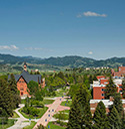Exercise Physiology and Nutrition
The exercise physiology and nutrition program allows students to focus on understanding the determinants of physical activity and energy expenditure, adaptations to exercise that impact human work performance and disease risk, and exercise metabolism and nutrition. A graduate student may earn a verification statement by completing required classes in the MSU dietetics program. The verification statement is needed in order to apply to an accredited dietetic internship. A strength of this graduate program is the opportunity for students to participate in research within the Health and Human Performance or Nutrition Research Laboratories.
Graduate programs in Exercise Physiology and Nutrition will customize their programs for future employment within a variety of fields including:
- Future pursuit of a doctoral degree
- Medical school
- Clinical and/or cardiac rehabilitation centers
- Clinical and fitness equipment companies
- Fitness/wellness facilities
- Coaching
- Sports nutritionist and other nutrition fields (requires RD)
Prerequisites
Ideally, entering graduate students will have completed a bachelor's degree in Exercise Science, Nutrition, or a closely related field (e.g., Biology, Pre-Physical Therapy) with appropriate background course work (e.g., chemistry, biology, anatomy, physiology). Students without an appropriate undergraduate background may still enter the program, but will be required to take a number of undergraduate prerequisite courses prior to graduate course work.
Admissions
Admissions decisions are based on:
- Undergraduate preparation (GPA and strength of prerequisite course work)
- Goodness of fit and how consistent interests and goals of student align with research and outreach goals of faculty (to be addressed in personal essay)
- Relevant professional experience
- Strength of letters of recommendation

















